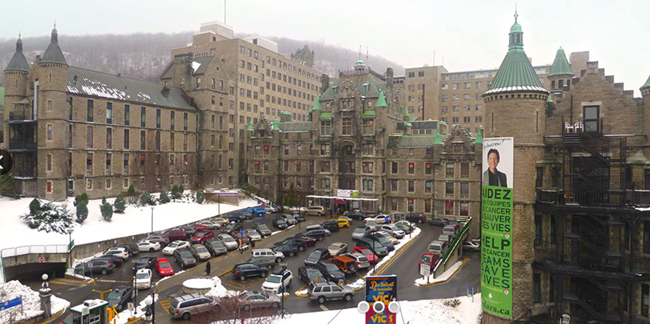The former Royal Victoria Hospital sits like a baronial manor near the top of McGill’s downtown campus of McGill. The RVH’s 14 buildings and mountainside site are now without a mandate, since the hospital moved to the Glen site in April 2015.
The University continues its study on whether to acquire the RVH site as a way to extend McGill’s campus. Christopher Manfredi, Provost and Vice-Principal (Academic), and Yves Beauchamp, Vice-Principal (Administration and Finance), presented the RVH-Academic Vision and Development Plan at the Senate meeting on April 25, 2017. The main academic elements of the RVH proposal are two clusters (sustainability systems and public policy), with multidisciplinarity and innovation (including entrepreneurship) as organizing principles through discovery centres/hubs and shared spaces.
The next big development in the decision-making process is a co-design session on Monday, May 8, that will bring together some 60 to 80 academics, architects, students and faculty as well as external stakeholders.
In 2015, Principal Suzanne Fortier struck a Task Force on the Academic Mission and Vision for the RVH to explore the academic future of the RVH site. That group decided that the development of the site should be focused on two strategically-important areas of the university: sustainability and public policy. The Provost followed up on this decision by pulling together a stakeholder group to develop the academic plan that was ultimately submitted to the government in December 2016.
The Senate presentation outlined how the planned focal areas of sustainability and public policy might inform the next incarnation of the Vic. Shared spaces will create opportunities for cross-disciplinary discussion and collaboration and will be accessible to external partners, potentially creating opportunities for revenue generation. Thus, one cluster would focus on public policy; the other would develop a multidisciplinary sustainability systems theme:
- Molecular/Materials Systems (bringing together chemistry, physics, electrical/mechanical/computer engineering, and mining and materials)
- Earth Systems (geography, Earth, atmospheric and oceanic sciences, civil/mechanical/chemical engineering, mining and materials)
- Urban Systems (geography, architecture, urban planning, civil, electrical/computer engineering)
Cross-disciplinary institutes and centres – such as the McGill School of the Environment, the Trottier Institute for Sustainability in Engineering and Design, and the Trottier Institute for Science and Public Policy and others that are yet to be created – would serve as academic bridges between the clusters.
“Innovation and entrepreneurship will be an important part of the activities of the Vic, both to address a different kind of student for the 21st century, but also very importantly, a different kind of university in which intellectual activity is no longer dominantly attached to single disciplinary departments,” Manfredi told Senate. “That is the most important theme running through the academic plan.”
Beauchamp presented a video of what the RVH site could become, and a PowerPoint document outlining what the proposal looks like so far.
Beauchamp explained that his team is working on the pre-acquisition dossier d’opportunité to be presented to the Quebec government. He told Senators it would be wonderful to acquire the site, but not at any cost.
“Next year we will be done with the opportunity study and we’ll be able to make a decision to acquire or not. If we decide to acquire, then we go to another phase called the dossier d’affaires that will cost about $25 million; this is the real design with architects. That leads to the beginning of construction, something which we think will take about four years, with a total cost of about half a billion dollars, depending on the size of the project.”
Beauchamp told Senate that, if all goes well, the first shovel could break ground in March 2021 – an auspicious date because that year will mark McGill’s 200th anniversary.

